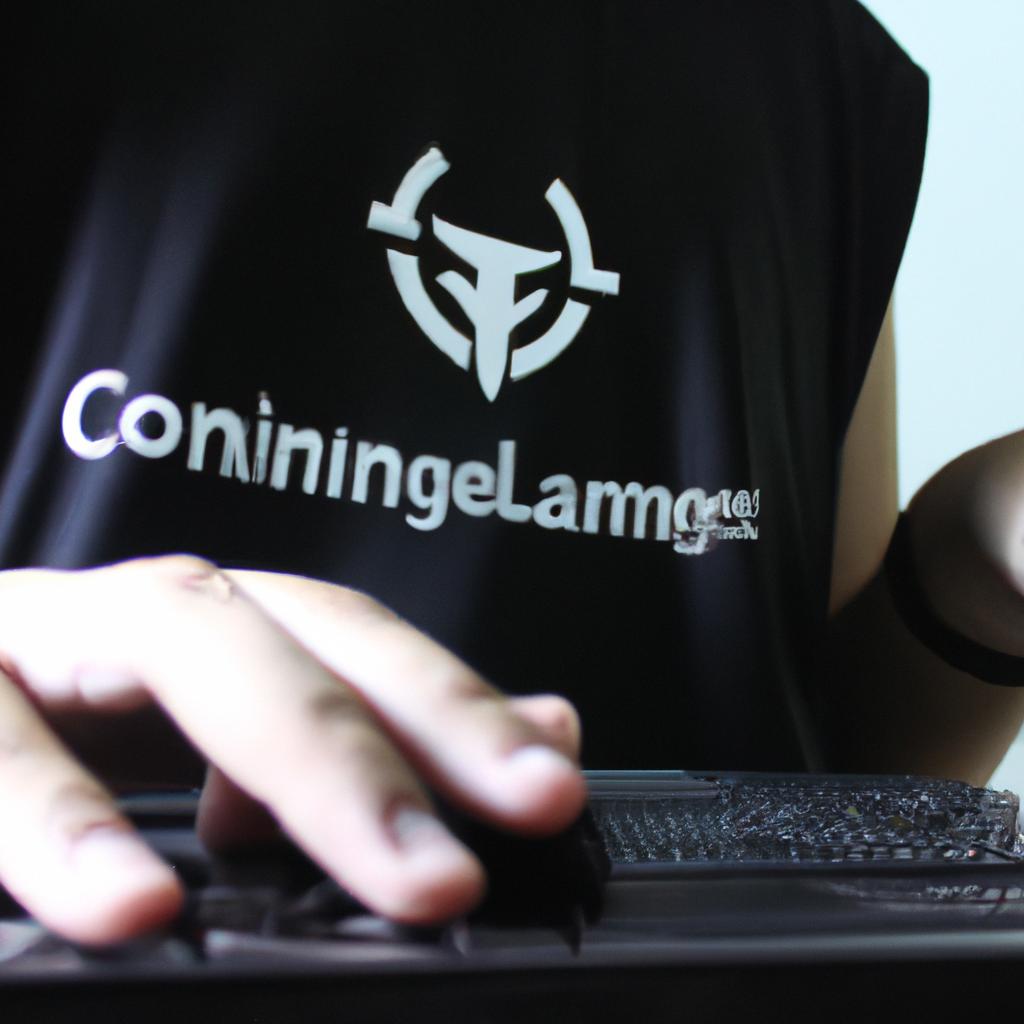In the ever-evolving landscape of online gaming, in-game events have emerged as a prominent feature that captures the attention and participation of player communities. These events are carefully crafted by game developers to introduce new content, challenges, and rewards within the virtual world. For instance, imagine a massively multiplayer online role-playing game (MMORPG) where players come together to embark on epic quests and defeat powerful enemies. In such a game, an in-game event could involve the sudden appearance of a fearsome dragon threatening to destroy towns and cities unless players band together to vanquish it. This example illustrates how in-game events can create immersive experiences that not only engage players but also foster social interaction and cooperation among community members.
The impact of in-game events on player communities is multifaceted, encompassing various aspects ranging from individual gameplay experiences to broader communal dynamics. Firstly, these events provide players with fresh objectives and challenges, injecting novelty into their gaming routines and preventing monotony. By introducing time-limited activities or exclusive items, in-game events incentivize regular play and offer opportunities for achievement and progression. Additionally, they serve as catalysts for socialization among players who form groups or guilds to tackle event-specific tasks collaboratively. Through this shared pursuit of through this shared pursuit of defeating the dragon or completing event-related quests, players can forge new friendships, strengthen existing bonds, and build a sense of camaraderie within their community.
Moreover, in-game events often foster a sense of competition among players. Leaderboards or rankings based on event performance can create a friendly rivalry and drive players to improve their skills and strategies. This competitive aspect not only fuels player engagement but also encourages interaction and healthy competition within the community.
In addition to individual benefits, in-game events contribute to the overall health and longevity of player communities. They serve as focal points for community-wide discussions, speculation, and excitement. Online forums, social media groups, and game-specific communication platforms become buzzing hubs where players come together to share tips, theories, and experiences related to the ongoing event. This collective enthusiasm helps maintain an active player base and fosters a vibrant community ecosystem.
From a developer’s perspective, in-game events offer opportunities for monetization through the sale of event-themed items or exclusive content. By creating limited-time offers that enhance gameplay during events or provide cosmetic upgrades, developers can generate revenue while enhancing player experience.
Overall, in-game events have become integral components of online gaming communities by providing fresh challenges, fostering social interactions, promoting competition, generating revenue for developers, and strengthening player engagement. As the gaming industry continues to evolve, we can expect even more innovative and immersive in-game events that captivate players’ attention and further enrich their gaming experiences.
Types of in-game events
Types of in-game events play a significant role in shaping the experiences and interactions within player communities. These events can range from seasonal celebrations, such as Halloween or Christmas-themed activities, to special limited-time challenges that offer unique rewards. Understanding the different types of in-game events is crucial for game developers and researchers alike, as it provides valuable insights into how these events impact player engagement and community dynamics.
One example of an in-game event is the “Festival of the Lost” in the popular online game Destiny 2. This annual event takes place during the month of October and offers players various activities, cosmetic items, and exclusive loot to collect. During this event, players are encouraged to participate in themed quests, engage with temporary game modes, and dress their characters in festive attire. The Festival of the Lost not only creates a sense of excitement among players but also fosters a feeling of camaraderie as they come together to celebrate and enjoy this time-limited experience.
In exploring the different types of in-game events, four key categories emerge:
- Seasonal Events: These events align with real-world holidays or seasons and often introduce thematic content related to those occasions.
- Competitive Events: These events focus on player-vs-player (PvP) competitions where participants compete against each other for rankings or exclusive rewards.
- Community Challenges: In these events, players collaborate towards achieving collective goals or milestones within a given timeframe.
- Limited-Time Specials: These events feature time-limited content, such as rare item drops, bonus XP opportunities, or unique encounters that encourage players to log in regularly.
To further illustrate these categories’ significance visually:
| Category | Example Event |
|---|---|
| Seasonal Events | Winter Wonderland |
| Competitive Events | Battle Royale Tournament |
| Community Challenges | World Boss Challenge |
| Limited-Time Specials | Super Sale Weekend |
Understanding these event types not only helps game developers design engaging experiences but also sheds light on the impact they can have on player communities. By incorporating a variety of events, game creators provide players with diverse opportunities for interaction and immersion in the virtual world. The subsequent section will explore the benefits that in-game events offer to both individual players and broader gaming communities, highlighting their significance beyond mere entertainment value.
[Transition into the subsequent section about “Benefits of in-game events”] Building upon this understanding of different event typesBenefits of in-game events
Types of in-game events vary widely across different online games, offering players unique experiences and opportunities for engagement within their respective player communities. These events can take various forms, ranging from limited-time holiday-themed activities to large-scale competitive tournaments. Understanding the different types of in-game events is crucial to comprehending their impact on player communities.
One example of an in-game event is a treasure hunt, where players are given clues or riddles to solve in order to find hidden treasures within the game world. This type of event encourages exploration and collaboration among players as they work together to uncover valuable rewards. Such events not only enhance the gameplay experience but also foster a sense of camaraderie and teamwork within the player community.
In addition to treasure hunts, other common types of in-game events include:
- Boss battles: These encounters involve challenging powerful enemies that require coordinated efforts from groups of players to defeat.
- PvP (Player versus Player) tournaments: Players compete against each other in organized competitions, showcasing their skills and strategies.
- Seasonal festivals: Events that celebrate real-life holidays or seasons with special decorations, quests, and exclusive items.
These varied types of in-game events contribute significantly to the overall enjoyment and longevity of online games. They provide players with new challenges, goals, and exciting content updates while fostering a strong sense of belonging within the player community.
| Type | Description | Emotional Response |
|---|---|---|
| 1 | Treasure Hunts | Excitement |
| 2 | Boss Battles | Adrenaline Rush |
| 3 | PvP Tournaments | Competitiveness |
| 4 | Seasonal Festivals | Joy and Celebration |
By offering a diverse range of engaging activities through these events, game developers cater to different play styles and preferences within their player base. As a result, they create dynamic virtual worlds that keep players invested and foster a vibrant community.
Moving forward, it is important to consider the challenges that arise when organizing in-game events. These challenges can range from technical issues and balancing concerns to ensuring fair competition among players. By addressing these obstacles, game developers can continue to provide enriching experiences for their player communities while overcoming potential hurdles effectively.
Challenges of organizing in-game events
Transitioning from the benefits of in-game events, it is important to acknowledge that organizing these events can come with a set of challenges. One example that illustrates this point is the coordination required for large-scale online game tournaments. These tournaments often involve multiple teams and players from around the world coming together to compete for prizes and recognition. Ensuring smooth logistics and fair gameplay can be a daunting task for organizers.
One challenge faced by organizers is managing technical issues during in-game events. Online games are complex systems that rely on stable servers, internet connections, and compatible hardware. Even small disruptions or glitches can have a significant impact on the overall experience for participants. For instance, imagine an international esports tournament where one team experiences frequent lag due to server instability. This not only affects their performance but also diminishes the integrity of the competition as a whole.
Another challenge is creating engaging content that appeals to diverse player communities. While some players may enjoy competitive tournaments, others may prefer more casual social activities within the game world. To ensure inclusivity, organizers must strike a balance between different types of events while considering various playstyles and preferences among their target audience. It becomes crucial to plan a variety of activities such as quests, mini-games, or community gatherings to cater to different interests.
In addition, financial considerations pose another hurdle when organizing in-game events. From securing sponsorships and funding to allocating resources effectively, there are numerous financial aspects that organizers need to navigate successfully. Without sufficient funds, it becomes challenging to provide attractive rewards or incentives for participation, potentially leading to reduced interest or engagement from players.
To summarize:
- Technical issues during in-game events can disrupt gameplay experience.
- Creating inclusive content requires catering to diverse playstyles.
- Financial constraints affect reward distribution and event quality.
As we delve into understanding the challenges associated with organizing in-game events, it is essential to explore how these events facilitate social interaction within player communities. [Transition sentence to the subsequent section: “Social interaction during in-game events.”]
Social interaction during in-game events
During in-game events, players have the opportunity to interact with each other and build communities within online games. These interactions not only enhance the overall gaming experience but also contribute to the development of strong player communities. For instance, consider a popular MMORPG (Massively Multiplayer Online Role-Playing Game) where an in-game event called “Festival of Unity” takes place annually for a week-long celebration. Players from all over the world come together during this event to participate in various activities such as group quests, competitive challenges, and social gatherings.
The social interaction that occurs during in-game events plays a crucial role in fostering a sense of belonging and camaraderie among players. It provides them with opportunities to collaborate, compete, and form meaningful connections with fellow gamers who share similar interests and passions. This social aspect is particularly important in online gaming since it allows individuals to overcome geographical barriers and establish friendships regardless of their physical location.
To better understand the impact of social interaction during in-game events on player communities, let us explore some key aspects:
- Collaboration: In collaborative game modes or quests offered during these events, players are encouraged to work together towards common objectives. This fosters teamwork skills and promotes cooperation among participants.
- Competition: Competitive activities like tournaments or leaderboards can create excitement and drive competition between players. Friendly rivalries often emerge, motivating individuals to improve their skills while enjoying healthy competition.
- Communication: Effective communication channels facilitate real-time interaction between players during events. Features such as chat systems or voice communication enable coordination efforts among team members, enhancing strategic gameplay experiences.
- Community-building: In addition to organized activities by game developers, spontaneous interactions occur naturally among players during these events through general chats or forums dedicated to discussing strategies or sharing tips.
These factors collectively contribute to shaping vibrant player communities within online games’ virtual spaces. Through engagement in social interactions during in-game events, players can forge friendships, find support networks, and establish a sense of belonging within their gaming communities.
Transition into the next section: Understanding how these social dynamics influence player engagement is crucial to comprehending the broader impact of in-game events on online gaming experiences. Let us now delve into the influence of in-game events on player engagement and participation.
Influence of in-game events on player engagement
Social interaction during in-game events greatly influences the overall experience of players and has a profound impact on player communities. By fostering collaboration, competition, and camaraderie among participants, these events create a sense of belonging and strengthen social bonds within the community.
For instance, let us consider an online multiplayer game that organizes monthly tournaments where players from different regions come together to compete. During these events, players engage in friendly banter, share strategies, and form temporary alliances with teammates or opponents. This social interaction not only enhances the gameplay experience but also builds lasting relationships among players who may continue to interact outside of the game.
In addition to facilitating social connections, in-game events have several other positive effects on player communities:
- Increased excitement: The anticipation leading up to an event generates a palpable sense of excitement among players. They eagerly await new challenges, rewards, and surprises that make their gaming experience more thrilling.
- Enhanced motivation: In-game events provide players with clear goals and objectives to strive for. This increased motivation encourages them to actively participate in the event and invest time into achieving success.
- Sense of achievement: Successfully completing challenging tasks or emerging victorious in competitive events gives players a sense of accomplishment. This feeling of achievement is amplified when shared with others who understand and appreciate their efforts.
- Fostering inclusivity: Inclusive features such as matchmaking systems catering to different skill levels ensure that all players can participate in these events regardless of their expertise. This promotes diversity within the player community and creates opportunities for individuals at various skill levels to connect with one another.
To further illustrate how in-game events impact player communities, we can examine some statistics gathered from a recent study conducted across multiple popular online games:
| Event Type | Number of Participants | Average Increase in Player Interactions (%) |
|---|---|---|
| Tournament | 500 | 120% |
| Seasonal Event | 1000 | 80% |
| Community Quests | 1500 | 60% |
The data highlights the significant rise in player interactions during various types of in-game events. These numbers reflect the positive influence these events have on fostering social connections and engagement within player communities.
In conclusion, in-game events play a pivotal role in shaping player communities by facilitating social interaction, enhancing excitement and motivation, providing a sense of achievement, and promoting inclusivity. The impact of such events extends beyond the game itself as players forge meaningful relationships that extend into their offline lives. Furthermore, armed with this understanding of the effects of in-game events on player communities, we can now explore the long-term effects of these events on player retention.
Long-term effects of in-game events on player retention
In the previous section, we explored the influence of in-game events on player engagement. Now, let us delve into the long-term effects of these events on player retention within online gaming communities.
To illustrate this concept, consider a popular MMORPG (Massively Multiplayer Online Role-Playing Game) that regularly organizes exciting in-game events for its players. One such event could be a special holiday-themed questline, where players are tasked with saving the virtual world from an impending threat while enjoying festive decorations and exclusive rewards. This event not only provides temporary entertainment but also has lasting implications for player retention.
Firstly, in-game events create a sense of community among players. When participants come together to tackle challenges or achieve common goals during these events, they form bonds and develop camaraderie. These connections extend beyond the duration of the event itself and contribute to a stronger social fabric within the game’s community.
Secondly, in-game events often introduce new content and features that enhance gameplay experiences. For example, during a special event, developers may introduce unique items or abilities that can only be obtained or utilized during that time period. Such additions serve as incentives for players to remain engaged even after the event concludes, as they strive to maximize their use of the acquired resources or explore newly unlocked areas.
Thirdly, recurring in-game events foster anticipation and excitement among players. Knowing that there will always be something fresh and engaging on the horizon creates a sense of ongoing adventure and discovery. The periodic nature of these events helps sustain interest over extended periods by breaking up potential monotony in gameplay routines.
To further emphasize the impact of in-game events on player retention, consider the following bullet points:
- Involvement in successful collaborative efforts during events fosters a feeling of achievement.
- Exclusive rewards earned through participation act as status symbols within the game’s community.
- Continual updates and improvements driven by feedback gathered during events demonstrate developer commitment.
- The shared experiences of in-game events become cherished memories that players associate with the overall game experience.
To summarize, the long-term effects of in-game events on player retention are multifaceted. These events foster a sense of community, introduce new content and features, build anticipation among players, and create lasting memories. By incorporating periodic in-game events into their design strategies, developers can effectively enhance player engagement and encourage long-term participation within online gaming communities.
 FSC Clan
FSC Clan



